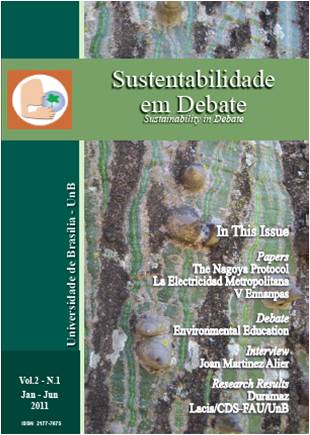Inovação e Sustentabilidade:
LACIS/FAU/CDS/FGA-UnB
DOI:
https://doi.org/10.18472/SustDeb.v2n1.2011.3915Keywords:
Innovation, Applied research, Collaborative networks, Supply chain of the construction industry, Solid waste management, Urban and social regenerative processesAbstract
The twenty-first century challenges require the acceleration of the technological paradigms changes in
order to minimize environmental impacts and waste of natural resources, and reduce emissions and pollution. Among the main impactful activities on the planet quotes the production of the built environment which is a result of the processes of the productive chain of the construction industry (PCCI). The study of the
acceleration of technological paradigm shift is linked to the study of the innovation process. The understanding of the influence vectors of the innovation process of PCCI requires studies that identify how new ideas are generated and integrated into the production process and products. These studies require the development of specific models which must be tested in practice through pilot projects. Studies aimed at identifying forces responsible for the emergence of innovations and demonstrating the relations between different actors and vectors of influence become relevant. In this sense, among the contributions that are being given in the University of Brasilia it can be quoted the Lacis/UnB. The aim of this paper is to present the trajectory of Lacis/FAU/CSD/FGA-UNB in the last five years and the main results of applied research with a focus on the productive chain of the construction industry, integrated management of solid waste and regenerative urban and social processes. A presentation of the Lacis evolutionary process requires the demonstration of theoretical principles that underlie its evolution, the origins and stages of its development and the results of the applied research projects.
Downloads
References
Editora Vozes Ltda., Petrópolis, 2010.
BLUMENSCHEIN, R. N. A Sustentabilidade
na Cadeia Produtiva da Indústria da Construção,
252p., UnB, CDS, Doutorado em Política
e Gestão Ambiental, Brasília, 2004.
BLUMENSCHEIN, R. Three studies of
innovation in the construction industry. 1989.
66f. Dissertação (Mestrado em Economia e Administração
Aplicadas à Indústria da Construção).
Bartlett School of Architecture and Planning.
University College London.
CAPRA, F. As conexões ocultas. São Paulo:
Editora Cultrix. 2002. 296p.
CAPRA, F.A. A teia da vida. São Paulo. Cultrix.
1996. 256p.
DOSI, G. et al. Technical change and economic
theory. Great Britain: Pinter Publishers, 1988,
641p.
FREEMAN, C. The economics of technical
change. Cambridge Journal of Economics.
England, v. 18, p463-514, 1994.
FREEMAN, C. The national system of
innovation in historical perspective.
Cambridge Journal of Economics. England, v. 19,
n.1, p. 5-22, feb 1995.
JOHNSON, S. Where Good Ideas Come From:
the Natural History of Innovation; Penguim
Books, Londres, 2010.
LACIS. Planejamento Estratégico. FAU/CDS/
FGA-UnB, Brasília, 2011.
LEGISLATIVE ASSEMBLY OF
QUEENSLAND. Nature Conservation Act. Act
No 20. Queensland 1992. Reprinted em june 2010.
LEMOS, C. Inovação na era do conhecimento.
Parcerias estratégicas, Brasília, n.8, p. 157-
179, maio, 2000.
LYLE, J. T. Regenerative Design for
Sustainable Development. New York: John
Wiley & Sons, 1994. cap. 10, p. 281-305.
SCHUMPETER, J.A. The theory of economic
development. Cambridge (Mass): Harvard
University Press, 1949.
SCHUMPETER, J.A. Business cycles. Vol.I.
New York: McGraw-Hill Book Company Inc.,
1939.
SILVA, A. B. & REBELO, L.M.B. A emergência
do pensamento complexo nas organizações.
Revista de Administração Pública, Rio de
Janeiro, v. 37, 777-796, jul/ago 2003.
VIOTTI, E.B. Passive and active national
learning systems. 1997. 311f. Tese (Doutorado
em Filosofia). The Graduate Faculty of Political
and Social Science of the New School for Social
Research, EUA.
Downloads
Published
How to Cite
Issue
Section
License
Copyright (c) 2011 Sustentabilidade em Debate

This work is licensed under a Creative Commons Attribution-NonCommercial-NoDerivatives 4.0 International License.
SUSTAINABILITY IN DEBATE – Copyright Statement
The submission of original scientific work(s) by the authors, as the copyright holders of the text(s) sent to the journal, under the terms of Law 9.610/98, implies in the concession of copyrights of printed and/or digital publication to the Sustainability in Debate Journal of the article(s) approved for publication purposes, in a single issue of the journal. Furthermore, approved scientific work(s) will be released without any charge, or any kind of copyright reimbursement, through the journal’s website, for reading, printing and/or downloading of the text file, from the date of acceptance for publication purposes. Therefore, the authors, when submitting the article (s) to the journal, and gratuitous assignment of copyrights related to the submitted scientific work, are fully aware that they will not be remunerated for the publication of the article(s) in the journal.
The Sustainability in Debate Journal is licensed under Creative Commons License – Non-Commercial-No-Derivation Attribution (Derivative Work Ban) 3.0 Brazil, aiming at dissemination of scientific knowledge, as indicated on the journal's website, which allows the text to be shared, and be recognized in regards to its authorship and original publication in this journal.
Authors are allowed to sign additional contracts separately, for non-exclusive distribution of the works published in the Sustainability in Debate Journal (for example, in a book chapter), provided that it is expressed the texts were originally published in this journal. Authors are allowed and encouraged to publish and distribute their text online, following publication in Sustainability in Debate (e.g. in institutional repositories or their personal pages). The authors expressly agree to the terms of this Copyright Statement, which will be applied following the submission and publishing by this journal.






